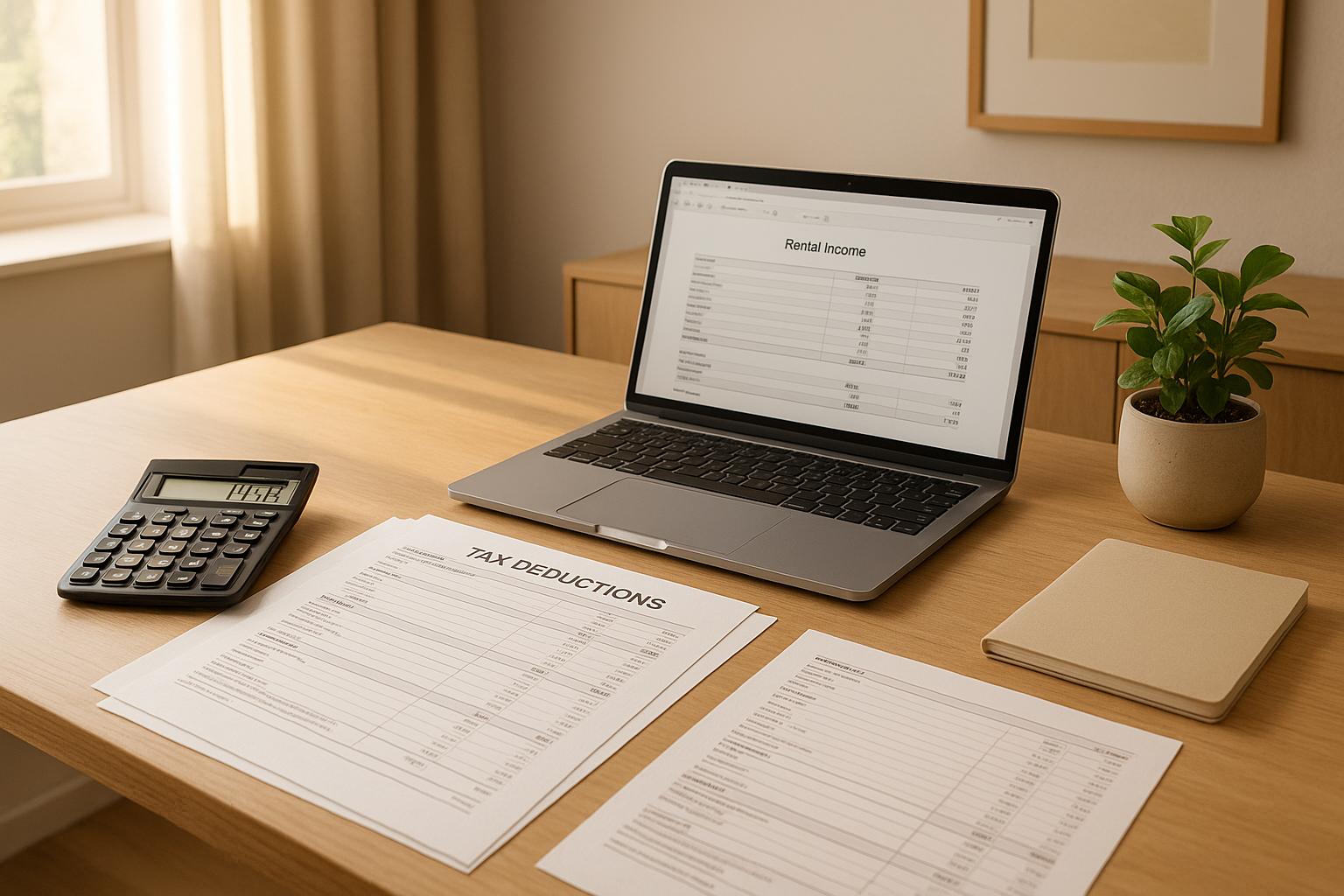Want to save money on your rental property taxes? Here’s what you need to know: Tax deductions and tax exemptions both reduce your tax burden, but they work differently.
- Deductions lower your taxable income by subtracting expenses like mortgage interest, repairs, and property management fees.
- Exemptions reduce your property’s taxable value, cutting your property tax bill. In Texas, exemptions like the homestead exemption don’t apply to rental properties, but other benefits may.
| Feature | Deductions | Exemptions |
|---|---|---|
| What it affects | Rental income (federal taxes) | Property value (local taxes) |
| Examples | Repairs, insurance, depreciation | Senior citizen or disability exemptions |
| Timing | Claimed yearly on tax returns | Applied after approval |
Key takeaway: Use deductions to lower your income taxes and exemptions to reduce property taxes. Combine both for maximum savings. Keep detailed records and consult a tax professional to ensure you’re claiming everything you’re eligible for.
Tax Deductions vs. Exemptions: Basic Concepts
Tax Deductions Explained
Tax deductions lower your taxable income by subtracting certain eligible expenses. These often include costs related to operating, maintaining, and depreciating your property.
For example, if you earn $24,000 and claim $9,000 in deductions, your taxable income drops to $15,000. This can lead to considerable savings, especially if you’re in a higher tax bracket.
Common deductions for rental property owners include:
- Mortgage interest payments
- Property insurance premiums
- Maintenance and repair costs
- Property management fees
- Utility costs (if paid by the owner)
- Fees for professional services like legal or accounting work
Next, let’s explore how exemptions can further reduce your tax burden.
Tax Exemptions Explained
Tax exemptions lower the assessed value of your property before taxes are calculated. In states like Texas, property tax exemptions can significantly reduce the taxable value of your property, which in turn lowers your annual property tax bill.
For instance, if your rental property is valued at $400,000 and you qualify for a $25,000 exemption, your property taxes would be calculated as if the property were worth $375,000. This reduction happens before the tax rate is applied, making exemptions especially useful in areas with high property taxes.
Now, let’s compare how deductions and exemptions work to save you money.
Comparing Deductions and Exemptions
Both deductions and exemptions help reduce your tax liabilities, but they work in different ways and can be combined for maximum savings.
| Feature | Tax Deductions | Tax Exemptions |
|---|---|---|
| Application | Applied to rental income | Applied to property value |
| Timing | Claimed annually on tax returns | Typically applied automatically after approval |
| Calculation Method | Subtracted from gross income | Reduced from assessed property value |
| Documentation | Requires receipts and records of expenses | Requires proof of eligibility |
| Flexibility | Varies yearly based on incurred expenses | Fixed once approved |
Rental property owners can take advantage of both deductions and exemptions, as they target different aspects of your tax obligations. To ensure you’re maximizing these benefits and staying compliant with tax laws, consider consulting a tax professional.
TOP 9 TAX DEDUCTIONS For Your RENTAL PROPERTY
Property Tax Exemptions in Texas
In Texas, property tax exemptions vary depending on whether the property is owner-occupied or used as a rental. Primary residences can take advantage of the homestead exemption, which lowers the taxable value, resulting in reduced property taxes. Rental properties, however, are not eligible for this benefit.
Homestead Exemption Rules
The homestead exemption applies to owner-occupied homes, reducing their taxable value. This directly decreases the annual property tax bill for homeowners who qualify.
Additional Exemptions for Specific Groups
Certain groups, such as disabled veterans and senior citizens, may qualify for extra property tax exemptions in Texas. Be sure to check the state’s tax guidelines to determine if you’re eligible.
Up next, find out how to claim these tax benefits.
sbb-itb-4c99469
Common Rental Property Deductions
When it comes to rental properties, understanding deductions can help lower your tax bill. Here are some key expenses you can deduct.
Property Operating Costs
Operating expenses often make up a big chunk of tax deductions. These include:
- Property taxes: Local taxes paid annually.
- Mortgage interest: Interest on loans tied to the rental property.
- Insurance premiums: Coverage like property, liability, and flood insurance.
- Utilities: Costs for water, electricity, and gas paid by the landlord.
- Maintenance and repairs: Expenses for routine upkeep and minor fixes.
- Property management fees: Typically 8-10% of the monthly rent.
Property Depreciation Rules
You can depreciate the building’s value (not the land) over 27.5 years using the Modified Accelerated Cost Recovery System (MACRS). The formula is straightforward:
Deduction = Building value ÷ 27.5
For example, if the building value is $275,000, your annual depreciation deduction would be $10,000.
Business Services and Travel
Additional expenses tied to running your rental business are also deductible:
- Legal and accounting fees: Costs for tax prep, legal advice, and accounting services.
- Marketing expenses: Fees for property listings and ads.
- Travel costs: Mileage (65.5 cents per mile for 2024), parking fees, and tolls.
- Home office expenses: A portion of your home office costs, based on its business use.
How to Claim Tax Benefits
Filing for Tax Exemptions
To apply for property tax exemptions in Texas, you’ll need to submit the necessary paperwork to your local appraisal district. Here’s what you’ll typically need:
- Application form: Download this from your local appraisal district’s website.
- Proof of identity: A valid Texas driver’s license or state-issued ID.
- Property-related documents: Gather property deeds, mortgage statements, and any relevant invoices for both exemption filings and tax reporting.
- Special exemption documentation: If you’re applying for specific exemptions (like those for seniors or disabled veterans), ensure you have the required proof.
Make sure to check with your local appraisal district for submission deadlines to avoid missing out.
After filing your exemptions, focus on accurately preparing and reporting your annual deductions.
Reporting Deductions on Tax Returns
For rental property deductions on your federal tax return, you’ll need to use specific IRS forms:
- Schedule E (Form 1040): For reporting rental income and expenses.
- Form 4562: To claim depreciation.
- Form 8582: For passive activity losses.
Keep detailed financial records to back up your claims. Some key documents to organize include:
- Purchase agreements and mortgage statements
- Property tax and insurance receipts
- Repair invoices and utility bills
- Travel logs for property-related visits
- Management fee records
- Mortgage interest summaries
Helpful Tips:
- Use separate bank accounts or accounting software to track rental-related transactions.
- Keep digital backups of all documents for easy access.
- Sort records by tax year and category to stay organized.
Following these steps will help you stay prepared and ensure your rental property tax benefits are properly claimed.
Conclusion
Key Takeaways
Tax deductions and exemptions can help reduce your tax burden, but they work in different ways. Here’s a quick breakdown:
- Deductions: Lower your federal taxes by reducing your taxable rental income. You’ll need to keep detailed records of your expenses.
- Exemptions: Decrease your property tax by reducing the assessed value of your property. These require proof of eligibility and ownership.
Understanding this difference is crucial when planning your tax strategy.
Seeking Professional Tax Advice
Navigating tax benefits can be complex, especially for rental property owners. Consulting with a tax professional who specializes in rental properties can make all the difference. The Austin Local Team can also connect you with real estate experts who understand both property investments and the tax landscape in Austin.
Why work with professionals?
- They specialize in rental property tax rules and can help you maximize your benefits.
- They have insight into Austin’s local market and regulations, ensuring tailored advice.
- Annual tax planning sessions can help fine-tune your investment strategy.
- Regular reviews ensure you’re taking advantage of every available tax benefit.
Tax laws change often, and staying informed is essential. A professional can help you keep up with new regulations while ensuring you get the most out of deductions and exemptions.
FAQs
What tax deductions and exemptions can rental property owners in Austin qualify for, and how can I determine my eligibility?
As a rental property owner in Austin, understanding the difference between tax deductions and exemptions is essential for maximizing your savings. Tax deductions reduce your taxable income by accounting for expenses like property repairs, mortgage interest, and property management fees. Exemptions, on the other hand, might exclude certain income or properties from being taxed altogether, depending on eligibility.
To determine what you qualify for, start by reviewing your property-related expenses and consulting IRS guidelines for rental property owners. Common deductions include maintenance costs, property taxes, insurance premiums, and depreciation. For exemptions, check if your property or income meets specific criteria outlined by federal or local tax laws.
If you’re unsure, working with a tax professional or a knowledgeable local real estate expert can help you identify opportunities to save. Platforms like Austin Local Team can connect you with trusted professionals who understand the nuances of the Austin real estate market and can guide you through the process.
How can I correctly apply for and make the most of property tax exemptions in Texas?
To ensure you’re correctly applying for and maximizing property tax exemptions in Texas, start by identifying the exemptions you qualify for, such as the Homestead Exemption, Over-65 Exemption, or Disabled Veteran Exemption. You can find detailed eligibility criteria on your county’s appraisal district website.
Once you’ve confirmed eligibility, gather the required documents, such as proof of residency or identification, and submit your application to your local appraisal district by the April 30th deadline. Be sure to double-check all forms for accuracy to avoid delays.
For rental property owners, while exemptions are generally limited to primary residences, you can explore tax deductions for expenses like maintenance, property management fees, and mortgage interest to lower your taxable income. If you’re in Austin, consider reaching out to the Austin Local Team for insights into the local housing market and property valuation to further optimize your tax strategy.
How do rental property tax deductions and exemptions work together to maximize tax savings?
Tax deductions and exemptions can significantly reduce your taxable income as a rental property owner, but they work in different ways. Tax deductions lower your taxable income by allowing you to subtract eligible expenses, such as mortgage interest, property repairs, and property management fees. Tax exemptions, on the other hand, exclude certain types of income or property value from being taxed altogether.
When combined, deductions and exemptions can help you retain more of your rental income. For example, claiming deductions for maintenance costs while also benefiting from exemptions on specific property types can lead to substantial tax savings. Consult with a tax professional to ensure you’re taking full advantage of both strategies while staying compliant with tax laws in Austin. For tailored advice on managing your rental property, the Austin Local Team can connect you with local experts who understand the unique aspects of the Austin market.





